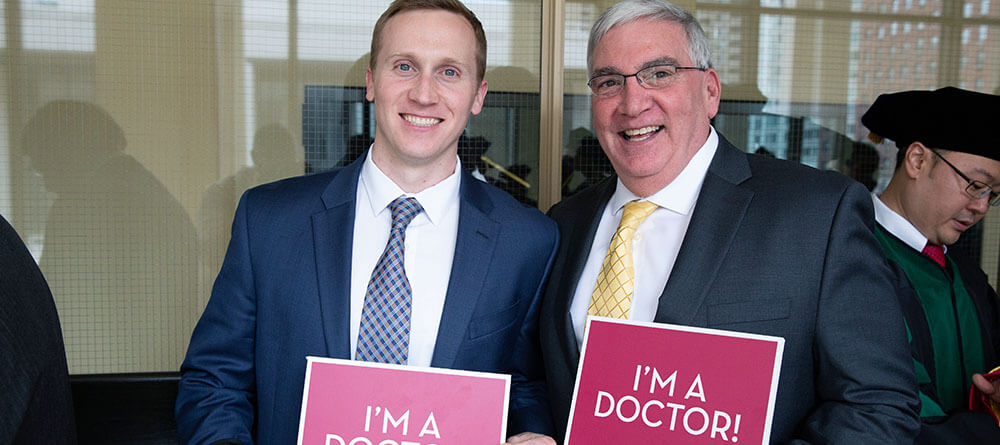Whether it’s been a longstanding dream you’ve had to put on hold or a newfound calling, you just can’t shake the thought of going to medical school to become a doctor. It’s easy to assume that goal may be out of reach, but not so fast.
You might be surprised to know some of the obstacles in your way are less problematic than they seem. We identified five common barriers that aspiring MDs think could stand in their way. Keep reading to learn how you can get past these roadblocks to achieve your dream of practicing medicine.
1. I don’t have good enough grades
Students beginning medical school during the 2023-2024 school year had an average GPA of 3.7, according to the Association of American Medical Colleges (AAMC). But your undergraduate grades aren’t everything. Your Medical College Admission Test (MCAT) scores, personal statement, and interview performance are also important factors.
Some schools holistically review applicants from the beginning. Rather than automatically discounting students who don’t hit a certain MCAT or GPA threshold, these programs also consider each student’s personal qualities and life experiences. Evaluating applicants in this way can help promote a more diverse student body, which may result in better patient outcomes. Some research suggests that students who are exposed to people from different backgrounds in medical school feel better prepared to work with diverse populations in practice.

2. I don’t know how to get through the application process
If you’re new to the medical school application process, it can be hard to figure out how to tackle each step. Anesthesiologist Renee Sunday says her biggest obstacle was that she didn’t have much support leading up to the MCAT and while figuring out medical school applications. Fortunately, she was able to rely on her peers.
“Groups of friends came together and shared how they were achieving their goals in the application process,” she says.
Dr. Sunday mentions another way pre-med students can make applying to medical school less intimidating by seeking out mentors. In fact, she herself now offers guidance for med school hopefuls.
“I have had, and will continue to have, conversations with pre-medical and medical students to help smooth out the process,” she offers.
3. I’m too old
The traditional transition to medical school is to begin classes right after you complete your undergraduate degree. But just because that’s the typical pathdoesn’t mean it’s the only one. Some individuals attend medical school after gaining a substantial amount of work experience in a different or related field.
“I was actually in research for six years prior to medical school,” says Dr. Jacqueline Larson, pediatric gastroenterologist and St. George’s University (SGU) graduate. Dr. Larson had always been passionate about medicine but didn’t know if it was still a feasible option since she was so far removed from college. Her attitude started to change as she encountered more graduates from her eventual medical school. Dr. Larson applied, got accepted, and enrolled. Much to her surprise, she found she fit right in.

“We had students who were in their 20s, 30s, and 40s,” Dr. Larson recalls.
As nerve-wracking as it can be to apply as an older student, she encourages those individuals to think long term. She likens her journey to completing a marathon rather than trying to win it.
“That’s what you should be happy about—your accomplishment,” Dr. Larson says. “It’s not about how much time it took you to finish.”
4. I can’t afford it
While the cost of medical school can be intimidating, you should think of pursuing your MD as an investment in your future. It will enable you to pursue a career as a physician. And paying off loans can be manageable with a physician’s salary. Also look into what types of scholarships are available. Some institutions provide assistance, and there are even more options from various organizations and personal providers.

5. I got rejected from medical schools in the US
There’s no denying that the medical school applicant pool is incredibly competitive. Gaining an acceptance letter is becoming even more difficult. Just ask Dr. David Waldburg, SGU graduate and member of Tanner Rheumatology Specialists.
“I applied twice to US [medical schools],” Dr. Waldburg says. He found his email inbox filling up with rejection letters. This made him question his decision to pursue medical school altogether. “It can really make you want to give up your dream of becoming a physician,” he shares.
“It gives you opportunity where you feel like there’s no opportunities at all.”
Dr. Waldburg eventually looked into Caribbean programs and ultimately selecting the one that he felt was the best fit. He suggests other aspiring MDs consider following a similar path, like many other SGU graduates have.
“It gives you opportunity where you feel like there’s no opportunity at all,” he explains.
Overcome the obstacles
Some students may have an easier path to medical school acceptance if they have a flawless academic record and no break in their education. But that doesn’t mean you’re out of luck or silly for thinking, “I want to be a doctor.”
Just make sure you apply to the right programs. That might mean considering options outside the US, such as Caribbean medical schools. Find out why this route may actually be an ideal choice for many students by reading our article “Your Best Odds of Becoming a Doctor Might Not Be What You’d Expect.”
*This article has been updated from November 2021 to include current facts and figures.
This article has been updated from January 2021 to include current facts and figures.

